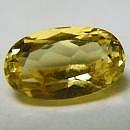|
|
||||||||||||||||
|
||||||||||||||||
|
||||||
|
|
|
|
Hydroxylherderite
|
|
| | |
| Discovered in 1894; IMA status: Valid (pre-IMA; Grandfathered) | ||
|
| ||
|
Chemistry |
|
|
| |
|
CaBe(PO4)(OH) | |
|
|
Calcium Beryllium Phosphate Hydroxide |
|
Molecular Weight: |
161.07 gm |
|
Composition: |
Calcium |
24.88 % |
Ca |
34.82 % |
CaO |
|
|
Beryllium |
5.60 % |
Be |
15.53 % |
BeO |
|
|
Phosphorus |
19.23 % |
P |
44.06 % |
P2O5 |
|
|
Hydrogen |
0.63 % |
H |
5.59 % |
H2O |
|
|
Oxygen |
49.67 % |
O |
|
|
|
|
|
100.00 % |
|
100.00 % |
= TOTAL OXIDE |
|
|
|
||||
|
Classification |
|
|
| |
|
Phosphates | |
|
2/D.17-120 | |
|
|
8 : PHOSPHATES, ARSENATES, VANADATES
|
|
Related to: |
Herderite-Hydroxylherderite Series. The hydroxyl-dominant analogue of Herderite. Isotypic with Datolite. |
|
Varieties: |
None |
|
Synonyms: |
Hydro-fluorherderite, Hydro-herderite, ICSD 67601, PDF 34-147 |
|
|
|
|
Crystal Data |
|
|
|
|
|
As stout prismatic crystals, elongated along [001] or [100], may be thick tabular {001}, typically with complex but rounded form development, to 17 cm; botryoidal to spherical, radial fibrous, in aggregates. |
|
|
On {100} or {001} or both, as “fishtail” contact twins, common |
|
|
|
|
|
Physical Properties |
|
|
|
|
|
Poor/Indistinct on {110} |
|
|
Irregular/Uneven |
|
|
Brittle |
|
|
5.0 - 5.5 |
|
|
2.95 (g/cm3) |
|
|
May fluoresce weak yellow under SW UV, sometimes with bright yellow-orange phosphorescence. |
|
|
Not Radioactive |
|
|
Other: |
Soluble in acids |
|
|
|
|
Optical Properties |
|
|
|
|
|
Colorless, gray, brown, pale yellow, greenish white, light blue, purple; colorless in transmitted light; may be blue-green or blue in daylight, lavender or light violet in incandescent light. |
|
|
Transparent to translucent |
|
|
Vitreous to subvitreous, resinous |
|
|
1.589 - 1.643 Biaxial ( - ) |
|
|
0.030 |
|
|
r > v, inclined |
|
|
None |
|
|
|
|
|
Occurances |
|
|
|
|
|
Geological Setting: |
A late-stage mineral in miarolitic cavities in complex granite pegmatites, of hydrothermal or probable pneumatolytic origin; may form from the alteration of beryl or beryllonite. |
|
Common Associations: |
Elbaite, Topaz, Cassiterite, Albite, Microcline, Muscovite, Lepidolite, Quartz |
|
Common Impurities: |
n/a |
|
Type Locality: |
Paris, Maine, USA |
|
Year Discovered: |
1894 |
|
View mineral photos: | |
|
|
|
|
More Information |
|
|
|
|
|
| |
|
|
|
|
Hydroxylherderite was named "Hydro-Herderite" in 1894 by Samuel L. Penfield. The name was changed to "Hydroxyl-Herderite" by Palache, Berman, and Frondel in 1954 and renamed Hydroxylherderite by Mineralogical Record (v39, 2008, p131). It was originally named for Siegmund August Wolfgang von Herder (1776-1838), Mining official in Freiberg, Germany. The "Hydroxyl" prefix signifies the dominance of hydroxide over fluorine. Locations
for Hydroxylherderite: Many
localities, but uncommon at most. Some for analyzed
material include: in the USA, in Maine, at Paris, Hebron,
Greenwood, Stoneham, and Newry, Oxford County, at Topsham,
Sagadahoc County, Poland and Auburn, Androscoggin County,
and elsewhere; in the Fletcher and Palermo #1 mines,
near North Groton, Grafton County, and at the Keyes
mine, Orange, Grafton County, New Hampshire; from the
Blue Chihuahua pegmatite, near Oak Grove, San Diego
County, California. In Germany, at the Epprechtstein
and Waldheim quarries, Fichtelgebirge, Bavaria. In the
Viitaniemi pegmatite, near Eräjärvi, Finland.
From Mursinsk, Ural Mountains, Russia. At Ungursuay,
Kazakhstan. In Brazil, large crystals from the Xandá
mine, Virgem da Lapa, and at the Golconda mine, near
Governador Valadares, Minas Gerais. |
|
|
We
have not photographed our Hydroxylherderite
gems
yet. Please
check back soon. |
